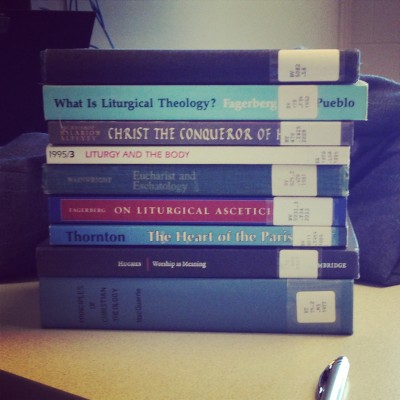The text in the picture means: Luther was here.
There is going to be a lot of talk this week about the meaning of freedom; there’s always a lot of talk of freedom around July 4, resolutions near January 1, money near April 15…it’s just what we do, it’s one way we can tell time rather effectively. I’ve been thinking about freedom this week and I’m going to channel my inner-Martin Luther—which is beyond rare and random for me—as I reflect on what freedom means for the Christian.
Luther’s On the Freedom of the Christian (or On Christian Liberty) is a fabulous writing on what it means to be free as a Christian. The overarching, overwhelming theme in this treatise is that in Christ the Christian is free. Duh. Fairly obvious given the title. This is basically my whole point in a nutshell: freedom is meaningless for the Christian unless we are talking about freedom-in-Christ. Religious liberties, civil liberties, economic liberties, etc. etc. etc. are but shadows—or even idols—of true freedom. We have construed freedom to mean the ability to do anything we want as long as it doesn’t harm another. That’s freedom run amuck.
Through the blood and sacrifice, through the cross and resurrection, through the meritorious works of Jesus we are freed from sin, suffering, evil, and death (as the last enemy).
But it doesn’t end there. And unfortunately, too much talk about soteriology in Western evangelicalism ends with a very personal, self-focused understanding of freedom. Salvation cannot, nay it must not, be boiled down simply to “being saved from sin.” It is that but it is so much more than that. Salvation, understood properly, entails being saved for something.
Here is how Luther understands freedom-in-Christ:
A Christian is an utterly free man, lord of all, subject to none.
A Christian is an utterly dutiful man, servant of all, subject to all.[1]
It is the first point that we seem to overly celebrate and the second that we neglect entirely. We read the second point, the idea that we are subject to all, and we recoil. We reject it out of hand because…well, because grace. It’s a lame answer but I think you get my gist. We—and I’m using a generous, collective “we” here—cannot stand thinking that our freedom makes us a servant. But please don’t miss this: the choice is ours. It is a free choice. Yes, it’ll cost you your whole life, but it is still a choice that’s entirely up to you.
The point of Christian freedom is that we can now choose to subject ourselves to others, to serve others, to be dutiful to others. And as such we willingly subject ourselves to the Law of Christ—or the Law of Love—in that we aim to live as Christ lived, to love as he loved, to treat others as he did, and to work for the salvation of all people.
A common refrain from people who are all about grace is “We’re in Christ and not under the Law!” And my response, and Luther’s response, is, “Wrong! In Christ you are under his law and you put yourself there willingly, knowingly, obediently!”
I am free. Free to serve, and love, and live. I am not free to do whatever I want, whenever I want, however I want that grace may abound. No. My actions and choices must align with the Law of Christ or I am still actively living in my sin. Be free my friends, be friend. That’s just a fancy way saying, “Get to work. Join Christ in the renewal of all things. Serve those around you. Love those whom you’ve never met. Point others to Jesus.”
You might also like: Apprenticeship and Discipleship or The Real Legacy of the English Reformation
[1] Translation of the Rev. Travis Loeslie. The translation of W.A. Lambert and revision of Harold J. Grimm is contained in Martin Luther: Three Treatises and the American edition of Luther’s works: “A Christian is a perfectly free lord of all, subject to none. A Christian is a perfectly dutiful servant of all, subject to all.” (Three Treatises, (Fortress Press), 1970, 277). Luther’s Latin is best: “Christianus homo omnium dominus est liberrimus, nulli subiectus. Christianus homo omnium servus est officiosissimus, omnibus subiectus.” (WA VII:49). Luther’s German translation from the Weimar Edition: “Eyn Christen mensch ist eyn freuer herr ueber alle ding und niemandt unterthan. Eyn Christen mensch ist eyn dienstpar knecht aller ding und yderman unterthan.” (WA VII: 21).













